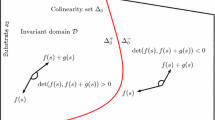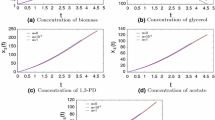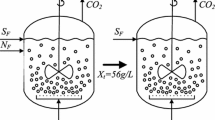Abstract
In this chapter the design ofa substrate feeding rate controller for a class of biotechnological processes in stirred tank bioreactors characterized by a decoupling between biomass growth and product formation is under study. As a typical example, we consider the most common case of monotonic specific growth rate and non-monotonic specific production rate. In general this yields a singular optimal control problem. Due to state inequality constraints -which reflect physical limitations- complete solutions are especially hard to obtain and almost non-existent in the literature.
However, the techniques proposed in the literature to convert the problem into a non-singular one all suffer from problems with respect to practical implementation. Therefore, we adopt the traditional point of view, i.e., singular optimal control with the volumetric substrate feed rate as the manipulated variable. We consider performance indices of both the yield type and the productivity type. The optimization of the initial substrate concentration is included also.
We illustrate that the determination of the switching times in the feed rate profile can be simplified a lot by incorporating as much as possible microbiological knowledge concerning the process under consideration. The results we present here are in this way general that they are written in terms of the specific reaction rates. In other words, an exact analytical expression for these rates is not required a priori. In addition, no assumptions have been made concerning the metabolism involved for biomass survival and possibly product synthesis.
The computational algorithms presented have some marked advantages over algorithms reported in the literature. In addition, we are able to deduce a complete general solution in the realistic case of both substrate and biomass concentration constraints. As an example, simulation results are given for the penicillin G fed-batch fermentation.
It is shown in Chapter 13 how a detailed analysis of the profiles presented here leads in a natural way to the design of model-independent control strategies which combine nearly optimal performance with excellent robustness properties: optimal adaptive control.
Access this chapter
Tax calculation will be finalised at checkout
Purchases are for personal use only
Preview
Unable to display preview. Download preview PDF.
Similar content being viewed by others
Bibliography
S.J. Parulekar and H.C. Lim 1985. Modeling, optimization and control of semi-batch bioreactors. Adv. Biochemical Eng. Biotechnol., 32, 207–258
A. Johnson 1987. The control of fed-batch fermentation processes: a survey. Automatica, 23, 691–705
V.M. Fishman and V.V. Biryukov 1974. Kinetic model of secondary metabolite production and its use in computation of optimal conditions. Biotechnol. Bioeng. Symp., 4, 647–662
H. Ohno, E. Nakanishi and T. Takamatsu 1976. Optimal control of a semibatch fermentation. Biotechnol. Bioeng., 18, 847–864
W.A. Weigand, H.C. Lim, C.C. Gregan and R.D. Mohler 1979. Optimization of a repeated fed-batch reactor for maximum cell productivity. Biotechnol. Bioeng. Symp., 9, 335–348
W.A. Weigand 1981. Maximum cell productivity by repeated fed-batch culture for constant yield case. Biotechnol. Bzoeng., 23, 249–266
K.Y. San and G. Stephanopoulos 1984. A note on the optimality criteria for maximum biomass production in a fed-batch fermentor. Biotechnol. Bzoeng., 26, 1261–1264
J. Staniškis and D. Levišauskas 1984. An adaptive control algorithm for fed-batch culture. Biotechnol. Bzoeng., 26, 419–425
J. Hong 1986. Optimal substrate feeding policy for a fed batch fermentation with substrate and product inhibition kinetics. Biotechnol. Bioeng., 28, 1421–1431
J.M. Modak, H.C. Lim and Y.J. Tayeb 1986. General characteristics of optimal feed rate profiles for various fed-batch fermentation processes. Biotechnol. Bioeng., 28, 1396–1407
H.C. Lim, Y.J. Tayeb, J.M. Modak and P. Bonte 1986. Computational algorithms for optimal feed rates for a class of fed-batch fermentation: numerical results for penicillin and cell mass production. Biotechnol. Bioeng., 28, 1408–1420
T. Yamane, T. Kume, E. Sada and T. Takamatsu 1977. A simple optimization technique for fed-batch culture. J. Fermentation Technol., 55, 587–598
R. Guthke and W.A. Knorre 1981. Optimal substrate profile for antibiotic fermentations. Bzotechnol. Bioeng., 23, 2771–2778
J.M. Modak and H.C. Lim 1989. Simple nonsingular control approach to fed-batch fermentation optimization. Biotechnol. Bioeng., 33, 11–15
K.Y. San and G. Stephanopoulos 1989. Optimization of fed-batch P enicillin fermentation: a case of singular optimal control with state constraints. Biotechnol. Bioeng., 34, 72–78
T. Kurtanjek 1991. Optimal nonsingular control of fed-batch fermentation. Biotechnol. Bioeng., 37, 814–823
J.F. Van Impe, B. Nicolaï, P. Vanrolleghem, J. Spriet, B. De Moor and J. Vandewalle 1992. Optimal control of the penicillin G fed-batch fermentation: an analysis of a modified unstructured model. Chem. Eng. Comm., 117, 337–353
J.F. Van Impe, and G. Bastin 1995. Optimal adaptive control of fed-batch fermentation processes with growth/production decoupling. Control Engineering Practice, 3(7), 939–954
J.F. Van Impe 1993. Modeling and optimal adaptive control of biotechnologicalzcal processes, PhD thesis, Department of Electrical Engineering, Katholieke Universiteit Leuven, 304 p.
A.E. Jr. Bryson and Y.C. Ho 1975. Applied optimal control. Hemisphere, Washington
R.K. Bajpai and M. Reuß 1980. A mechanistic model for penicillin production. J. Chiem. Tech. Biotechnol., 30, 332–344
R.K. Bajpai and M. Reuß 1981. Evaluation of feeding strategies in carbon-regulated secondary metabolite production through mathematical modelling. Biotechnol. Bioeng., 23, 717–738
M. Reuß, Personal communication
Author information
Authors and Affiliations
Editor information
Editors and Affiliations
Rights and permissions
Copyright information
© 1998 Springer Science+Business Media Dordrecht
About this chapter
Cite this chapter
Van Impe, J.F. (1998). Optimal Control of Fed-Batch Fermentation Processes. In: Van Impe, J.F.M., Vanrolleghem, P.A., Iserentant, D.M. (eds) Advanced Instrumentation, Data Interpretation, and Control of Biotechnological Processes. Springer, Dordrecht. https://doi.org/10.1007/978-94-015-9111-9_11
Download citation
DOI: https://doi.org/10.1007/978-94-015-9111-9_11
Publisher Name: Springer, Dordrecht
Print ISBN: 978-90-481-4954-4
Online ISBN: 978-94-015-9111-9
eBook Packages: Springer Book Archive




